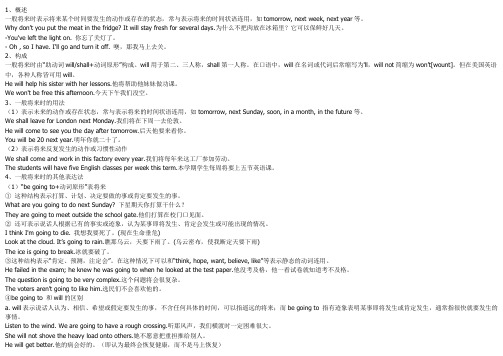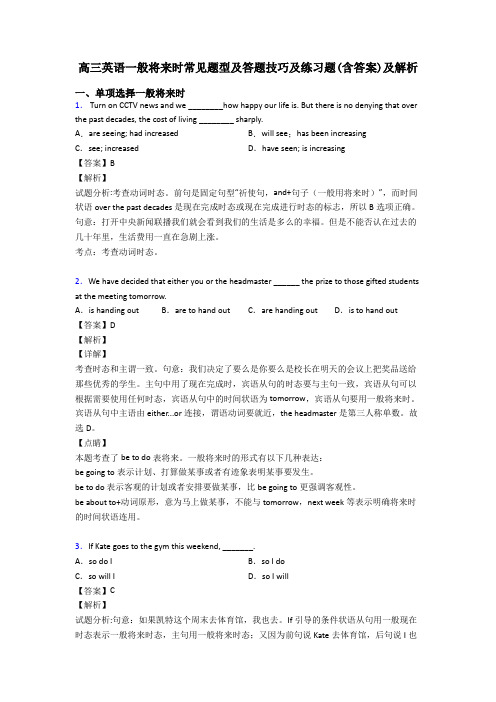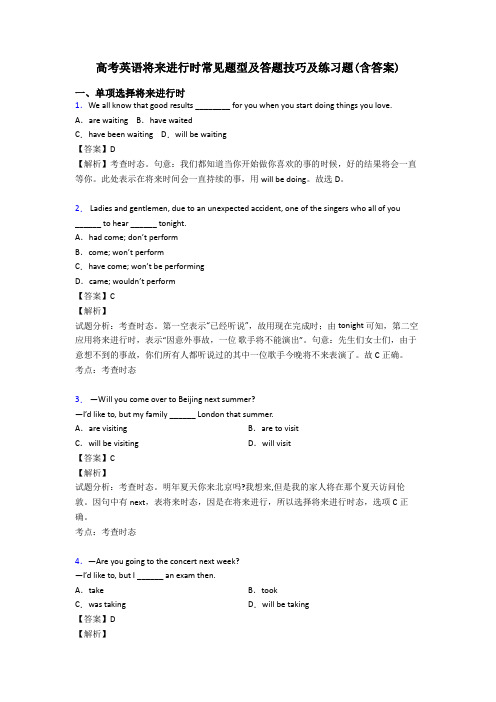2017之高考----英语将来时态讲解、练习、答案
- 格式:doc
- 大小:60.50 KB
- 文档页数:3

1、概述一般将来时表示将来某个时间要发生的动作或存在的状态,常与表示将来的时间状语连用,如tomorrow, next week, next year等。
Why don’t you put the meat in the fridge? It will stay fresh for several days.为什么不把肉放在冰箱里?它可以保鲜好几天。
-You've left the light on. 你忘了关灯了。
- Oh , so I have. I'll go and turn it off. 噢,那我马上去关。
2、构成一般将来时由“助动词will/shall+动词原形”构成。
will用于第二、三人称,shall第一人称。
在口语中,will在名词或代词后常缩写为'll,will not简缩为won’t[wount]。
但在美国英语中,各种人称皆可用will。
He will help his sister with her lessons.他将帮助他妹妹做功课。
We won't be free this afternoon.今天下午我们没空。
3、一般将来时的用法(1)表示未来的动作或存在状态,常与表示将来的时间状语连用,如tomorrow, next Sunday, soon, in a month, in the future等。
We shall leave for London next Monday.我们将在下周一去伦敦。
He will come to see you the day after tomorrow.后天他要来看你。
You will be 20 next year.明年你就二十了。
(2)表示将来反复发生的动作或习惯性动作We shall come and work in this factory every year.我们将每年来这工厂参加劳动。

高三英语一般将来时常见题型及答题技巧及练习题(含答案)及解析一、单项选择一般将来时1. Turn on CCTV news and we ________how happy our life is. But there is no denying that over the past decades, the cost of living ________ sharply.A.are seeing; had increased B.will see;has been increasingC.see; increased D.have seen; is increasing【答案】B【解析】试题分析:考查动词时态。
前句是固定句型“祈使句,and+句子(一般用将来时)”,而时间状语over the past decades是现在完成时态或现在完成进行时态的标志,所以B选项正确。
句意:打开中央新闻联播我们就会看到我们的生活是多么的幸福。
但是不能否认在过去的几十年里,生活费用一直在急剧上涨。
考点:考查动词时态。
2.We have decided that either you or the headmaster ______ the prize to those gifted students at the meeting tomorrow.A.is handing out B.are to hand out C.are handing out D.is to hand out【答案】D【解析】【详解】考查时态和主谓一致。
句意:我们决定了要么是你要么是校长在明天的会议上把奖品送给那些优秀的学生。
主句中用了现在完成时,宾语从句的时态要与主句一致,宾语从句可以根据需要使用任何时态,宾语从句中的时间状语为tomorrow,宾语从句要用一般将来时。
宾语从句中主语由either...or连接,谓语动词要就近,the headmaster是第三人称单数。

高考英语高中必备英语一般将来时技巧全解及练习题(含答案)一、单项选择一般将来时1.—Help me out in the kitchen and I ________ you to a cup of coffee.—Sounds good.A.will treat B.treatC.am treating D.have treated【答案】A【解析】考查时态。
句意:——要是你在厨房里帮我忙的话,我将请你喝咖啡。
——听起来不错。
根据对话语境可知,应用一般将来时。
2. ---- Jame s, do you know it’s Kate’s birthday tomorrow?---- Really? I ______ her a present after work this afternoon.A.will buy B.am going to buyC.am buying D.am to buy【答案】A【解析】试题分析:考查时态。
句意:杰姆斯,你知道明天是凯特的生日吗?真的吗?我今天下午下班后会给他买一个礼物。
买礼物的动作将来某一时刻做的事情,用一般将来时。
故选A。
考点:考查时态。
3.If you _____ his wife’s income____ his own,the total of their income _____ 3000 yuan. A.add; to; will add up to B.add; to; adds toC.add up; to; adds up to D.will add; for; adds up【答案】A【解析】试题分析:考查if引导条件状语从句及词的用法。
主句用一般将来时,从句用一般现在时表将来。
排除D。
Add...to 把...加在..., add up to总计达, add to增添。
句意:如果把他妻子的收入和他的收入加起来,总计达3000元。

高考英语将来进行时常见题型及答题技巧及练习题(含答案)一、单项选择将来进行时1.We all know that good results ________ for you when you start doing things you love. A.are waiting B.have waitedC.have been waiting D.will be waiting【答案】D【解析】考查时态。
句意:我们都知道当你开始做你喜欢的事的时候,好的结果将会一直等你。
此处表示在将来时间会一直持续的事,用will be doing。
故选D。
2. Ladies and gentlemen, due to an unexpected accident, one of the singers who all of you______ to hear ______ tonight.A.had come; don’t performB.come; won’t performC.have come; won’t be performingD.came; wouldn’t perform【答案】C【解析】试题分析:考查时态。
第一空表示“已经听说”,故用现在完成时;由 tonight 可知,第二空应用将来进行时,表示“因意外事故,一位歌手将不能演出”。
句意:先生们女士们,由于意想不到的事故,你们所有人都听说过的其中一位歌手今晚将不来表演了。
故C正确。
考点:考查时态3.—Will you come over to Beijing next summer?—I’d like to, but my family ______ London that summer.A.are visiting B.are to visitC.will be visiting D.will visit【答案】C【解析】试题分析:考查时态。

(完整版)英语将来时态讲解、练习、答案将来时表示法一般将来时表示在将来某个时间要发生的动作或存在的状态。
表示“将来”的句式很多,常用的句式及用法归纳如下:一、be going to+动词原形(专题与will的区别)1.这种结构表示主体现在打算在最近或将来要做某事。
这种打算往往是事先考虑好的。
如:My brother is going to learn English next year. 我哥哥准备明年学英语。
I am going to meet Tom at the station at six. 我六点钟要到火车站去接汤姆。
2.这种结构还可以表示说话人根据已有的迹象认为非常可能即将发生某事。
如:Look at these black clouds——it is going to rain. 看这些乌云——要下雨了。
I’m afraid I’m going to have a bad cold. 恐怕我要得重感冒了。
注意:1. 如果be going to后接的是形容词或副词(there)时,其后应加上be,然后再接形容词或副词。
如:I’m going to be busy this Sunday. 这个星期天我很忙2. there be句型也可用于这种句型中,但there不能和have连用。
如:There is going to be an English film this evening. 今天晚上有一场英文电影。
二、shall/ will+动词原形。
在书面语中,第一人称常用shall, 但在口语中,所有人称都可用will.1.will/ shall均可表示单纯的将来。
如:The radio says it willbe cloudy tomorrow. 收音机报道明天多云。
2.表示预料中将要发生的动作或情况。
如:You’ll feel better after having this medicine.吃了这药,你就会感到好些的。

2017年普通高等学校招生全国统一考试英语(新课标Ⅰ卷)参考答案及解析【答案快查】21-23 BDA 24-27 ACAB 28-31 DCCA 32-35 DBCD 36-40 DCAFE41-45 ABCDA 46-50 CBADB 51-55 DBCAC 56-60 DACBD61 as 62 effects 63 to process 64 are removed 65 a66 worse 67 is 68 eating 69 careful 70 which第二部分阅读理解(共两节,满分40分)A【语篇解读】本文是一篇应用文。
本文介绍了太平洋科学中心的一些附属服务项目和资助捐款信息。
广告号召人们踊跃为科学中心捐款,支持科学普及事业。
【答案解析】21. B 细节理解题。
由The store is located(位于) upstairs in Building 3 right next to the Laster Dome可知太平洋科学中心的纪念品购物商店位于三栋楼上。
故B项正确。
22. D 细节理解题。
由Today Pacific Science Center serves more than 1.3 million people a year and brings inquiry-based science education to classrooms and community events all over Washington State可知太平洋科学中心把科学教育带入了课堂。
23. A 推理判断题。
由It’s an amazing accomplishment and one we can’t achieve without generous support from individuals, corporations, and other social organizations. Visit to find various ways you can support Pacific Science Center可知太平洋科学中心取得的令人惊喜的成绩离不开个人、公司和其它社会组织的慷慨支持。
【英语】高中英语过去将来时及其解题技巧及练习题(含答案)含解析一、单项选择过去将来时1.I had a discussion with Mr. Baker and hoped he _________ us an early reply.A.would give B.give C.gave D.had given【答案】A【解析】试题分析:本句中横线前面使用的是过去式hoped,说明表示的是过去的希望,所以使用过去将来时。
句义:我和贝克先生进行了一次讨论,希望他能给我们较早的答复。
故A正确。
考点:考察时态2.—Have you been to Mexico?—No, I ______ last year, but Dad wouldn’t let me.A.was to have gone B.was to goC.was gone D.went【答案】A【解析】【详解】试题分析:考查时态。
句意:——你去过墨西哥吗?——没有,去年我打算去的,但爸爸不让我去。
be + to do通常表示“计划、安排”将要做的事情,还表示“有义务”要做的事。
但在此,was to have done表示“过去原打算要做而没有做的事”。
故选A。
3.John was given the same suitcase his father and grandfather _______with them to school. A.took B.had taken C.were taking D.would take【答案】D【解析】【详解】考查时态。
句意:约约翰得到了他父亲和祖父带去上学的同一个手提箱。
would表示过去常常的意思,相当于used to。
根据句意,此处表示“他父亲和祖父过去常常随身带着的”。
故选B。
4.Nowhere else, as Tim said, _____ except to the small garden in the backyard after school. A.he has gone B.he did goC.had he gone D.would he go【答案】D【解析】试题分析考查倒装。
高中英语一般将来时解题技巧讲解及练习题(含答案)及解析一、单项选择一般将来时1.—How long on earth shall I have to wait?—Sorry, sir. Just a minute. There ________ a table available.A.is B.was C.will be D.has been【答案】C【解析】考查动词时态。
句意为:我究竟要等多长时间?对不起,先生。
再等一会儿,马上就有空桌子了。
由语境可知,此处应用将来时,表示“将要有张桌子”。
故答案选C。
2.---Let’s throw a surprise party for mom’s 50th birthday.---That’s a good idea.We______several of her friends.A.invite B.have invited C.are inviting D.will invite【答案】D【解析】本题考查时态。
根据句意“我们将邀请她的一些朋友”可知用一般将来时。
句意:——让我们在妈妈50岁给她一个惊喜。
——好想法,我们将邀请她的一些朋友。
3.I ________ for Beijing next Saturday. Do you know when the earliest plane ________ on Ssturday?A.am leaving;takes off B.leave;takes offC.leave; is taking off D.am leaving; is taking off【答案】A【解析】试题分析:考查瞬间性动词的时态问题。
Arrive,leave,go等瞬间性动词用一般现在时表示将来时态。
一般现在时态中,主语是第三人称单数,谓语动词要加s。
句意:我下个星期六将要离开去北京。
你知道星期六最早的航班是什么时候的吗?故选A。
学习资料精品文档2017年全国高考英语真题分类汇编---动词时态语态和词义辨析1. (北京卷24.)—______ that company to see how they think of our product yesterday? —Yes. They are happy with it.A. Did you callB. Have you calledC. Will you callD. Were you calling答案:A, 分析:yesterday表示过去的时间,要用一般过去时,句意:“---你给那个公司打电话来弄清他们对我们产品的看法了吗?---是的,他们对我们的产品很满意”。
所以选A。
2. (北京卷29). In the 1950s in the USA, most families had just one phone at home, and wireless phones _______ yet.A. haven’t inventedB. haven’t been inventedC. hadn’t inventedD. hadn’t been invented 答案:D, 分析:in the 1950s是过去的时间,而到那时还没有无线电话,说明是“过去的过去”,句意:“在美国20世纪50年代,多数家庭家里只有一部电话,并且无线电话还没被发明出来。
”所以用过去完成时,选D。
3.(北京卷33). People______better access to health care than they used to, and they’re living longer as a result.A. will haveB. haveC. hadD. had had答案:B, 分析:than they used to,说明是现在和过去对比,且后半句and后are living longer用的是现在进行时,所以是现在时系列,句意:“人们有了比过去更好的医疗,人们活得更长久了。
2017英语高考真题——时态专题1. (北京卷. 24) —______ that company to see how they think of our product yesterday?—Yes. They are happy with it.A. Did you callB.Have you calledC.Will you callD.Were you calling2. (北京卷. 29) In the 1950s in the USA, most families had just one phone at home, andwireless phones _______ yet.A. haven’t inventedB. haven’t been inventedC. hadn’t inventedD. hadn’t been invented3. (北京卷. 33) People______better access to healt h care than they used to, and they’reliving longer as result.A. will haveB. haveC. hadD. had had4. (北京卷. 34) If the new safety system _______ to use, the accident would never havehappened.A. had been putB. were putC. should be putD. would be put5. (天津卷. 6) Nowadays, cycling, along with jogging and swimming, _______ as one ofthe best all-round forms of exercise.A. regardB. is regardedC. are regardedD. regards6. (天津卷. 8) I ________down to London when I suddenly found that I was on the wrongroad.A. was drivingB. have drivenC. would driveD. drove7. (天津卷. 15) —Do you have Betty’s phone number?—Yes. Otherwise, I ______able to reach her yesterday.A. hadn’t beenB. wouldn’t have beenC. weren’tD. wouldn’t be8. (江苏卷. 22) __________not for the support of the teachers, the student could notovercome her difficulty.A. It wereB. Were itC. It wasD. Was it9. (江苏卷. 24) The publication of Great Expectations, which_________both widelyreviewed and highly praised, strengthened Dickens, status as a leading novelist.A. isB. areC. wasD. were10. (江苏卷. 27) He hurried home, never once looking back to see if he_________.A. was being followedB. was followingC. had been followedD. followed11. (江苏卷. 31) He’s been informed that he _________for the scholarship because of hisacademic background.A. hasn’t qualifiedB. hadn’t qualifiedC. doesn’t qualifyD. wasn’t qualifying答案及解析1-5 ADBAB 6-10 ABBCA 11 C1. A。
一般将来时一般将来时表示在将来某个时间要发生的动作或存在的状态。
表示―将来‖的句式很多,常用的句式及用法归纳如下:一、be going to+动词原形(专题与will的区别)1.这种结构表示主体现在打算在最近或将来要做某事。
这种打算往往是事先考虑好的。
如:My brother is going to learn English next year. 我哥哥准备明年学英语。
I am going to meet Tom at the station at six. 我六点钟要到火车站去接汤姆。
2.这种结构还可以表示说话人根据已有的迹象认为非常可能即将发生某事。
如:Look at these black clouds——it is going to rain. 看这些乌云——要下雨了。
I’m afraid I’m going to have a bad cold. 恐怕我要得重感冒了。
注意:1. 如果be going to后接的是形容词或副词(there)时,其后应加上be,然后再接形容词或副词。
如:I’m going to be busy thi s Sunday. 这个星期天我很忙2. there be句型也可用于这种句型中,但there不能和have连用。
如:There is going to be an English film this evening. 今天晚上有一场英文电影。
二、shall/ will+动词原形。
在书面语中,第一人称常用shall, 但在口语中,所有人称都可用will.1.will/ shall均可表示单纯的将来。
如:The radio says it will be cloudy tomorrow. 收音机报道明天多云。
2.表示预料中将要发生的动作或情况。
如:You’ll feel better after having this medicine. 吃了这药,你就会感到好些的。
3.will表示人的主观意愿,它带有浓厚的感情色彩。
如:Come earlier tomorrow, or I won’t let you in. 明天早点儿来,否则我不让你进来。
4.在问对方是否愿意或表示客气的邀请或命令时,常用will。
如:Will you go to see a film with us? 你愿意和我们一起去看电影吗?5.shall表示建议或征求对方的意见。
如:Shall we go at eight? 我们八点去好吗?6.表示不以人们的意志为转移的规律。
如:He is fourteen this year, and he will be fifteen next year. 他今年十四岁,明年十五岁。
三、come, go, leave, fly, begin, arrive等表示位置转移的动词用现在时行时表示将来的动作。
如:Mr. Li says he is leaving for Beijing tomorrow. 李先生说他明天将去北京。
The sports meeting is beginning at three this afternoon. 运动会将于今天下午三点开始。
四、在条件、时间状语从句中用一般现在时表示将来的动作。
如:If it doesn’t rain, they will climb a hill tomorrow. 如果明天不下雨,他们将去爬山。
I’ll write to you as soon as I arrive home. 我一到家就给你写信。
五、come, go, start, leave等动词的一般现在时也可以表示将来,它是用来根据规定或时刻表示一定会发生的动作或状态。
与现在进行时态一样,一般现在时主要用于往返动作。
如:The train leaves at two o’clock p.m. 火车下午两点钟开。
The new term starts at the beginning of September. 新学期将于九月初开始。
注:表示往返和位置转移动词的一般现在时和现在进行时都可以表示按计划安排将要发生的事,但一般现在时表示―不可改变或不可随便更改的事件或计划‖,所以常用于时刻表;而现在进行时表示将来―按计划安排的事可能会改变‖。
六、用―情态动词+动词原形‖也可表示将来。
这种形式一般用于比较明显的表示将来的时间状语的句子中。
如:You must get up early tomorrow. 你明天必须得早起。
七、用―has better+动词原形‖也可以表示将来。
如:You’d better go to see your sister next week. 下周你最好去看看你妹妹。
八.―be to+动词原形‖表示按计划要发生的事或征求对方意见。
例如:①Are we to go on with this work?我们继续干吗?②The boy is to go to school tomorrow.这个男孩明天要去上学。
九.―be about to+动词原形‖表示即将发生的动作,意为:很快,马上。
后面一般不跟时间状语。
例如:We are about to leave.我们马上就走。
十、―be due to"构成的谓语,意味―定于…‖也可表示将来时PS :will与be going to 的分别be going to与will的区别be going to与will两者都可表示将要发生的事、将要去做某事,但它们有如下几点区别:1. be going to 表示近期、眼下就要发生的事情,will 表示的将来时间则较远一些,如:He is going to write a letter tonight.He will write a book one day.2. be going to 表示根据主观判断将来肯定发生的事情,will表示客观上将来势必发生的事情。
He is seriously ill. He is going to die.He will be twenty years old.3. be going to 含有―计划,准备‖的意思,而will 则没有这个意思,如:She is going to lend us her book.He will be here in half an hour.4.在有条件从句的主句中,一般不用be going to, 而多用will, 如:If any beasts comes at you, I'll stay with you and help you时间状语1)tomorrow, the day after tomorrow, tomorrowmorning/afternoon/evening2)next year/week/month/hour/day/century3)in+一段时间4)in the future5)this afternoon/Sunday/evening6)from now on7)one day, someday (未来的)某天8)soon形式●will 常简略为'll,并与主语连写在一起,如:I'll,he'll,it'll,we'll,you'll,they'll。
●一般疑问句如用will you…?其简略答语须是Yes,I will或No,I won't;如用Shall I…?(较少见)其简略答语须是Yes,I shall.或No,I shall not.一、单项选择。
( ) 1. There __________ a meeting tomorrow afternoon.A. will be going toB. will going to beC. is going to beD. will go to be( ) 2. Charlie ________ here next month.A. isn’t workingB. doesn’t workingC. isn’t going to workingD. won’t work( ) 3. He ________ very busy this week, he ________ free next week.A. will be; isB. is; isC. will be; will beD. is; will be( ) 4. There ________ a dolphin show in the zoo tomorrow evening.A. wasB. is going to haveC. will haveD. is going to be( ) 5. –________ you ________ free tomorrow?– No. I ________ free the day after tomorrow.A. Are; going to; willB. Are; going to be; willC. Are; going to; will beD. Are; going to be; will be( ) 6. Mother ________ me a nice present on my next birthday.A. will givesB. will giveC. givesD. give( ) 7. – Shall I buy a cup of tea for you?–________. (不,不要。
)A. No, you won’t.B. No, you aren’t.C. No, please don’t.D. No, please.( ) 8. – Where is the morning paper?– I ________ if for you at once.A. getB. am gettingC. to getD. will get二、动词填空。
1. I ______(leave)in a minute. I ______(finish)all my work before I ______ (leave).2. —How long _____ you _____(study)in our country?—I _____(plan)to be here for about one more year.—I _____(hope)to visit the other parts of your country.—What ______ you ______(do)after you ______(leave)here?—I ______(return)home and ______(get)a job.3. I ______(be)tired. I ______(go)to bed early tonight.4. Mary’s birthday is next Monday, her mother _____(give)her a present.三、句型转换。